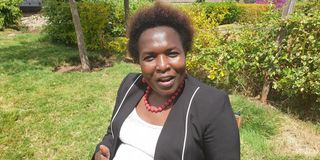Access to water key to development, says Kenya Rapid official

Doris Kaberia who is popularly referred to as ‘mama maji’ especially in parts of northern Kenya.
During water and sanitation meetings, especially in northern Kenya, where she has been working for years, Doris Kaberia is referred to as ‘mama maji’ (the water woman). She says this is a title she is proud of, adding that she is sometimes also referred to as ‘mama choo’ (the latrines woman).
A horticulturalist and natural resources management expert, Ms Kaberia is the chief of party at Kenya Resilient Arid Lands Partnership for Integrated Development (Rapid) programme and doubles as the director of Millennium Water Alliance-Kenya programmes.
Nation caught up with her in Wajir during a Kenya Rapid learning event.
Q. What does access to water mean to you?
A. Without water, there cannot be development. Even the national government’s Big Four agenda cannot be realised if there is no water. Water is needed in health, manufacturing, agriculture and housing among other sectors.
However, water is finite and it will get finished if we do not take care of it. The way to take care of it is to conserve the environment. I have been working in the water and sanitation sector for almost 10 years, especially in northern Kenya. From my experience, I believe that access to water brings a solution to many challenges including health, security, economic, food security among others.
What is the genesis of ‘mama maji’ and ‘mama choo’ titles?
I remember one time when we had gone to a place called Koor in Marsabit, and a USAID-funded programme had constructed a water and hygiene facility in the market. Immediately I stood to speak, a woman shouted, “There is mama maji na choo’. She had constructed a latrine out of the influence of a project I was working for and wanted me to go witness that achievement.
I am passionate on sensitising people on good hygiene. I remind them that by defecating openly, they will be making other people to drink contaminated water, thus putting them at the risk of contracting water-borne diseases.
When HIV was new, people working in the health sector were referred to by communities as ‘mtu wa HIV’ (the HIV person). However, it does not mean that the health worker is infected. Similarly, when they call me mama maji or mama choo, it doesn’t mean I literally build toilets. I advocate for access to water for all, and I encourage communities to build and use latrines.
What is the role women and youth in water and sanitation?
Women bear the burden of looking for water. In some areas, women have to walk all day in search of water. They also risk their lives while in search for water, yet, they have many more chores to attend to.
To the youth, you are not the leaders of tomorrow; though they may lead tomorrow, they have to start today. Some youths have been innovative, especially during the Covid-19 pandemic. Many have innovated soap and sanitiser dispensers. This kind of innovation is leadership already. The youths are very innovative. All we need is to provide the support they require. They need to be encouraged, and reminded that they can deliver.
Youths need to be offered opportunities because this is the way they will manage to showcase and grow their ideas into useful innovations and solve problems in communities while earning income.
What are some of the lessons learnt through the last five years of Kenya Rapid Programme?
We have realised that when you talk about northern Kenya, people just think about problems. On the contrary though, there are so many opportunities. There are opportunities for the government to engage with the development sector, for the private sector to come and invest and develop competent business models. There are also numerous opportunities for communities to ride on in the development projects and thrive economically, health-wise, socially and in other aspects.
Partnerships are relationship-building. The public sector may have resources but needs the development partners, the private sector, and communities.
The development world contributes only three per cent of the global water budget, while public and private sectors provide the rest. Therefore, the role of development organisations is to catalyse the 93 to 97 per cent.
Money is good, but it is just one of the things you need to achieve universal water coverage. It would be best if you also strengthened local capacities at both county governments and communities levels. That is why we built capacity for county employees. We need an enabling environment so that the county officers can deliver.
For the partnerships to succeed, there has been a shared vision, lots of compliments, synergies, collaborations, coordination and shared understanding.





